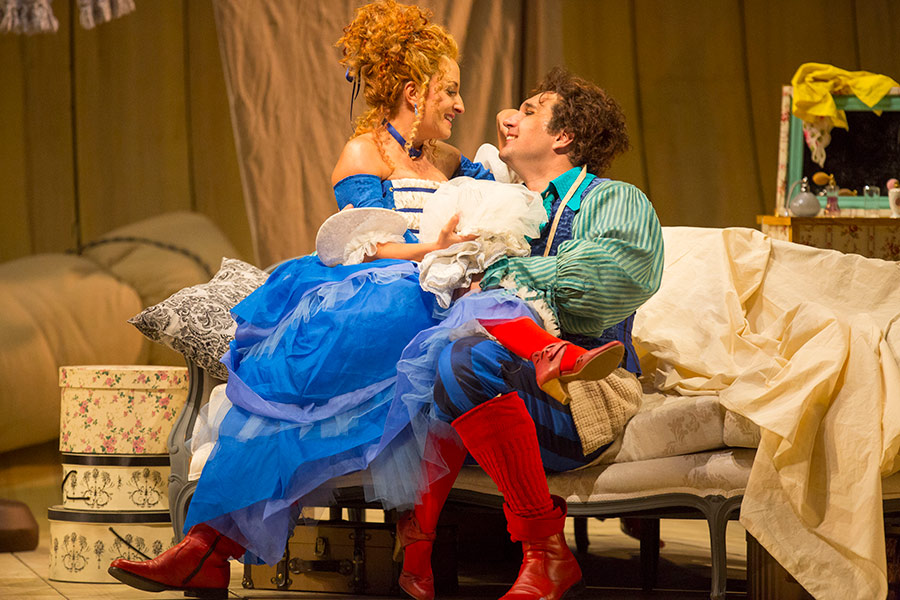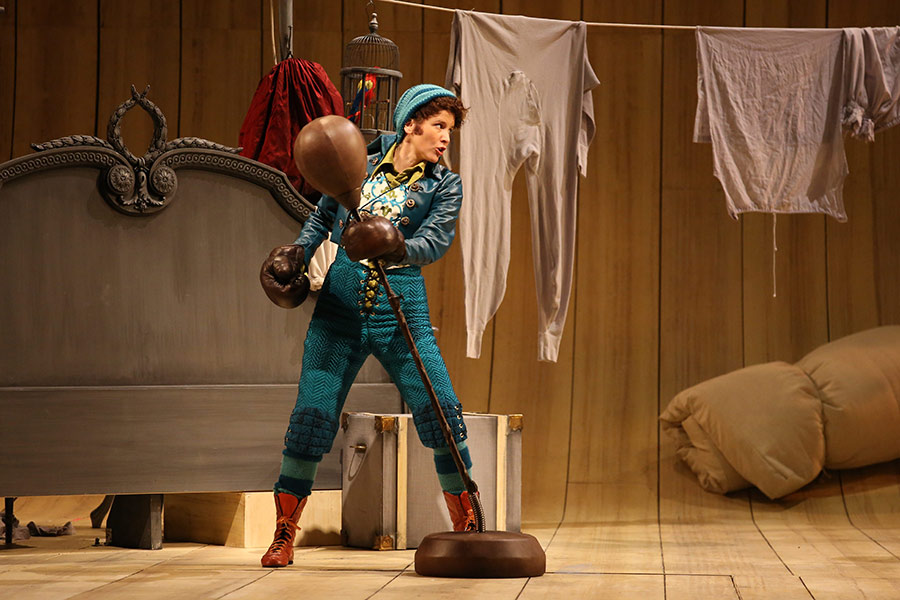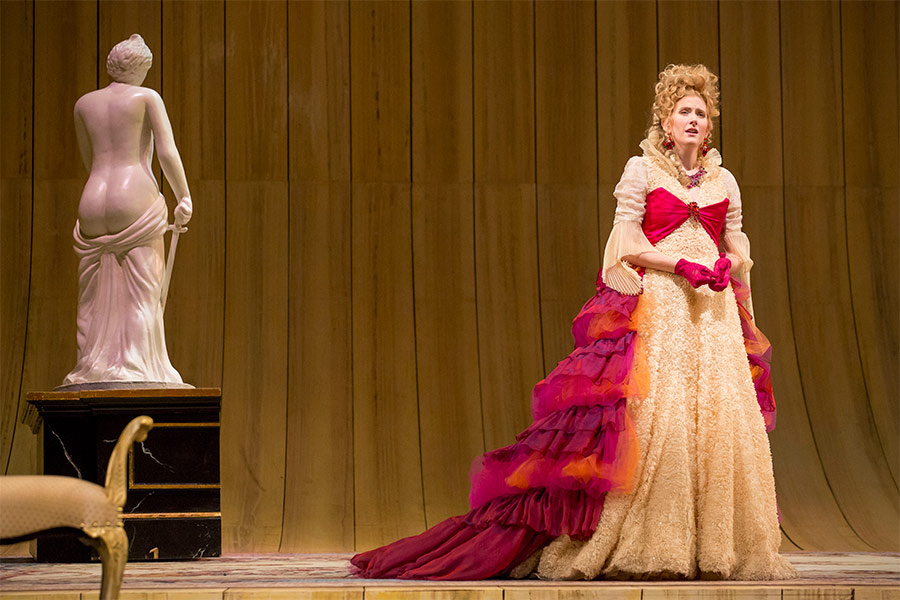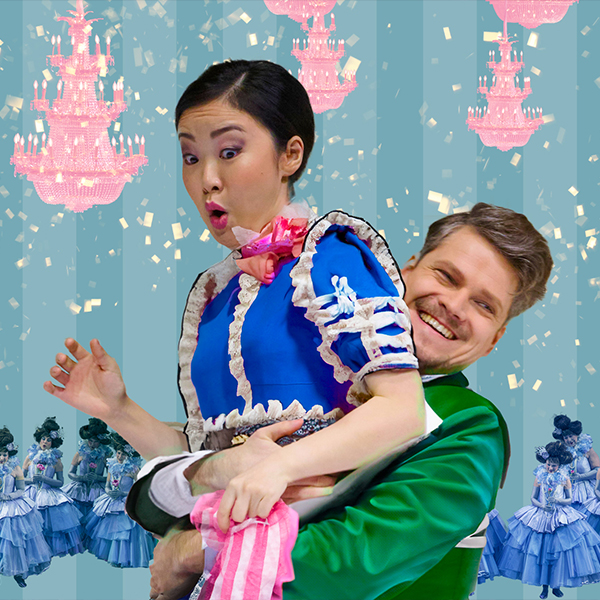November 08, 2024
The Marriage of Figaro: Craziness, Reciprocity, Love
Officially, The Marriage of Figaro (1786) is based on Beaumarchais's radical comedy of 1778, a savage indictment of feudalism that was quickly seen as a precursor of the French Revolution. Admirers of the play have typically found the opera disappointing, an innocuous and even trivial drama of personal love with no political bite. Sometimes directors, embarrassed by this critique, try to make the opera more "serious" by imposing a simple, overt political message on it, flouting the subtle and volatile passions of Mozart's music.
But the world of human passion, love, and craziness revealed in the music is profound in its own way, and it would be a mistake to think that human passion is trivial, or indeed that it is irrelevant to how men and women might possibly live together in society. The music, its own emotional universe, goes far deeper than Beaumarchais's play, and even than Da Ponte's witty libretto, making a subtle and enduring statement about the imperfections and glories of human love, and the need for generous acceptance of those imperfections, if we are ever to pursue happiness together in a flawed world.
For Beaumarchais, the story's central contrast is that between the Count, representative of the old regime, and Figaro, precursor of the new. One of our first clues to Mozart's subversive recasting is the fact, as we notice very early, that Figaro and the Count are very similar, both musically and thematically. (The two roles are written in such a way that the same singer can sing either role.) What do these men sing about when they are alone? Outraged honor, the desire for revenge, the pleasure of domination, sneering at your male adversary. What emotions are absent? Love, wonder, delight — even grief and longing. The energies that drive them are not alien, but deeply akin. If Figaro is the harbinger of a new world, we don't hear it, since his passions are those of the old. If he's going to be happy in love (and, we might add, if the new regime is to be happy in reciprocity), he will have to learn a different tune — and, as Mozart soon shows, he will need to learn it from women.
The females of the opera inhabit a musical and textual world that is from the beginning depicted as utterly unlike that of the men. First of all, it contains friendship. Susanna and the Countess plot together, joke together. Unlike the men, they use their similarity not for combat but for cooperation. All this is in the libretto — but the music takes the suggestion of reciprocity and equality much further. In the remarkable letter duet, the women take inspiration from one another's musical phrases, exchanging ideas with a sinuous capacity for response and a heightened awareness of the other's pitch, rhythm, and even timbre, ultimately achieving close-knit harmony. Their musical partnership expresses a kind of friendly attunement that is, we might say, an image of mutual respect, but also a reciprocal affection that is deeper than respect.

Christiane Karg as Susanna and Adam Plachetka as Figaro in Lyric's 2015/16 production of The Marriage of Figaro.
This duet has acquired fame in American popular culture because of its use in the film The Shawshank Redemption, when Tim Robbins, the convict who has become the prison's librarian, figures out a way to play it for all the prisoners over the PA system, and, locking the door, stops the prison hierarchy from interfering until the duet is done. The men of Shawshank certainly are not fans of classical music, but they hear something in this music, and stop in their tracks, transfixed by a promise of happiness. As Morgan Freeman's character expresses it, looking back:
I have no idea what those two Italian ladies were singing about. Truth is, I don't want to know. Some things are better left unsaid. I'd like to think they were singing about something so beautiful, it can't be expressed in words, and it makes your heart ache because of it...and for the briefest of moments, every last man in Shawshank felt free.
What do the prisoners hear in the duet? Freedom, they say. But why, and how? First, they cannot help hearing an absence of hierarchy in the evenly-matched voices, and a partnership based on responsiveness rather than dictatorial power. This, in the context of Shawshank prison, is already freedom. But, as the voices soar out over the squalor of the prison yard, I think there is more to be heard in it: the idea of a kind of internal freedom, a freedom of the spirit that consists precisely in not caring about hierarchy, neither seeking to avoid being controlled by others nor seeking to control them. And that's a freedom that does take the mind way away from Shawshank.
Both the Countess and Susanna exemplify reciprocity and internal freedom. Susanna, however, emerges as the more complete person. While the Countess remains preoccupied with her own sadness and eventual hope, Susanna displays enormous empathy with the Countess's situation (as well as that of her beloved Figaro), and has a mischievous quick-wittedness that makes her the primary driver of the plot. She exemplifies what a whole person can be: both clever and compassionate, decisive and loving, and all of this combined with humor and delight.
There is one male character in the opera who does not sing in a male voice: the teenage boy Cherubino, performed by a female mezzo-soprano. This already seems significant; Cherubino's education, it shortly emerges, is the focal point of the opera's depiction of what a new type of man might be.
Cherubino is usually treated superficially, as a running joke throughout the opera, and this is, more or less, the way Beaumarchais treats him. His preoccupation with women and sex is indeed the source of much of the plot, as he turns up repeatedly in places where he should not be. In many productions he is treated as a person with no sentiments, but only very intense bodily desires. Let us, however, pay closer attention to what he says and what he does.
Cherubino is clearly, in crucial ways, masculine. He is tall (Susanna has to ask him to kneel down so that she can put on his bonnet), good-looking (Figaro and the Count are both jealous of him), and sexually active (with his teenage girlfriend, Barbarina). But he has been educated by women and by music: The prospect of military service appalls him, and singing, by contrast, comes naturally. How do his emotions differ from those of all the male-voice characters in the opera?
He talks about love. He is the only male in the opera (before the last act, at any rate) who has the slightest interest in that emotion. Certainly, the breathlessness of "Non so più" expresses the promiscuous quality, as well as the confusion, of adolescent infatuation. But it also contains romantic and poetic sentiments. The musical idiom, breathless and yet tender, is utterly unlike the tense accents of the adult males. When we reach the Countess's chamber, Cherubino's difference from other males becomes even more evident. Deeply infatuated with the Countess, he has decided to make her a present. What sort of present? What naturally occurs to him is to write a poem, set it to music, and sing it himself.

Rachel Frenkel as Cherubino in Lyric's 2015/16 production of The Marriage of Figaro.
The content of that passion (in the beautiful aria "Voi che sapete") is remarkable for its utter difference from the arias of all the other males. First of all, Cherubino simply talks about love, and about its beautiful female object. He has nothing to say about other men, and he seems utterly impervious to questions of honor, shame, and competition. Second, he is eager to learn something, and he is eager to learn it from women: "You who know what sort of thing love is, women, tell me whether that is what I have in my heart." Third, unlike all the other males, he is utterly vulnerable, and he makes no attempt to conceal his vulnerability. Finally, and most remarkably, he locates what he is pursuing in a place outside of his own ego: "I seek a good that is outside myself." Hearing these words, we realize that no other male in the opera deigns to seek a good outside himself: all are preoccupied with winning a competitive victory, or shielding the ego from shame. The music of the aria would tell us all this without the words. Here if anywhere, Mozart's music moves well beyond Da Ponte's text.
How did Cherubino get to be this way, a way that promises real reciprocity in passion? Answer: He was brought up by women and kept a stranger to the men's world. I would argue that he is therefore the opera's pivotal character, a male who can be both delightful and loving.
What, then, happens at the opera's close, when the Count begs his wife for forgiveness? Temporarily, at least, the male world yields before the female world, asking for pardon. And then there is a pause. And what, in this silence, might the Countess be thinking, before she says "Yes"?
If she has any sense — and we know that she has a great deal — she will be thinking, What on earth does this promise of renewed love really mean? Has this man, who has behaved badly for years, really become a new person just because our joke succeeded and he is publicly embarrassed? And when, like the sensible woman she is, she gives herself the answer, "Surely not," then she must think again, asking herself, "But then, shall I accept him as he is, with his arrogance, his status-consciousness, his anxiety-driven infidelities? Shall I agree to live with just the hope or promise, and the occasional reality, of reciprocal love?"
When, after that pause, she answers, "I am nicer, and I say yes," with a phrase that arcs downward, as if to touch him, she is saying yes to the imperfection in all their lives, accepting the fact that love, if frequently real, will always be uneven and far from blissful; that people will never get the entirety of what they long for; that even if men are capable of learning from women — and both Figaro and the Count have learned at least something — nonetheless we hardly have reason to expect these achievements to be stable, given the pressures culture and upbringing exert on human development. Indeed, it seems far more likely that Cherubino will be corrupted by the male world around him than that the other men will drop their quest for honor and status and learn to sing like Cherubino. The aversion to shame and the narcissistic desire for control are profound human desires; they are unlikely to go away, yielding a world in which all lovers get everything they want.

Amanda Majeski as the Countess in Lyric's 2015/16 production of The Marriage of Figaro.
So, when she says that "yes," she is agreeing to love, and even trust, in a world of inconstancy and imperfection — an affirmation requiring more courage than any of the battlefield exploits mentioned by Figaro in "Non più andrai."
And here's where we arrive at politics, at a subtler and deeper level. What she agrees to, here, is also what the ensemble also agrees to: "Ah, all of us will be happy in that way." What that seems to mean is that all present say yes to a world that seeks and aims at reciprocity, respect, and attunement without being starry-eyed about perfection, a world in which people commit themselves to liberty, fraternity, and equality, while understanding that these transcendent ideals are not to be attained by exiting from the real world into a pristine world, but rather by pursuing them in this one, in episodes of love and craziness. Life together in society requires something like an unjaundiced trust in the possibility of love (at least sometimes and for a while), and, perhaps above all, a sense of humor about the world as it is and about the sometimes ridiculous heterogeneity of its inhabitants.
These are political ideas that place Mozart in conversation with other leading political thinkers of his time. Especially salient as an antagonist to what Mozart has in mind is Jean-Jacques Rousseau, whose On the Social Contract (1762) had already, and famously, explored similar terrain, insisting that the new non-monarchical form of political organization must cultivate new sentiments in its citizens. But whereas Rousseau emphasizes the need for civic homogeneity and solidarity, a patriotic love based on manly honor and the willingness to die for the nation, Mozart here envisages the new public love as something gentler, more reciprocal, more feminine — connected more to Cherubino's horror of warlike exploits than to Rousseauesque ideas of nationalistic valor. In the process, Mozart also eschews Rousseau's homogeneity, emphasizing that the new fraternity must protect spaces for the free play of mischief, craziness, humor, and individuality — all of which are connected, in the opera, to the women's world.
These ideas of love, trust, and reciprocity are not clear in the text, and far more emphatically brought out in the music. But Mozart's music is not in some unattainable heaven, it is in the middle of our world, and in the bodies of those who sing it; it reshapes the world by reshaping breath itself. "This day of torment, of craziness, of foolishness — only love can make it end in happiness and joy." Indeed.
Martha C. Nussbaum is Professor of Philosophy and Law at the University of Chicago. Her most recent books are Justice for Animals (2023) and The Tenderness of Silent Minds: Benjamin Britten and his War Requiem (2024).

